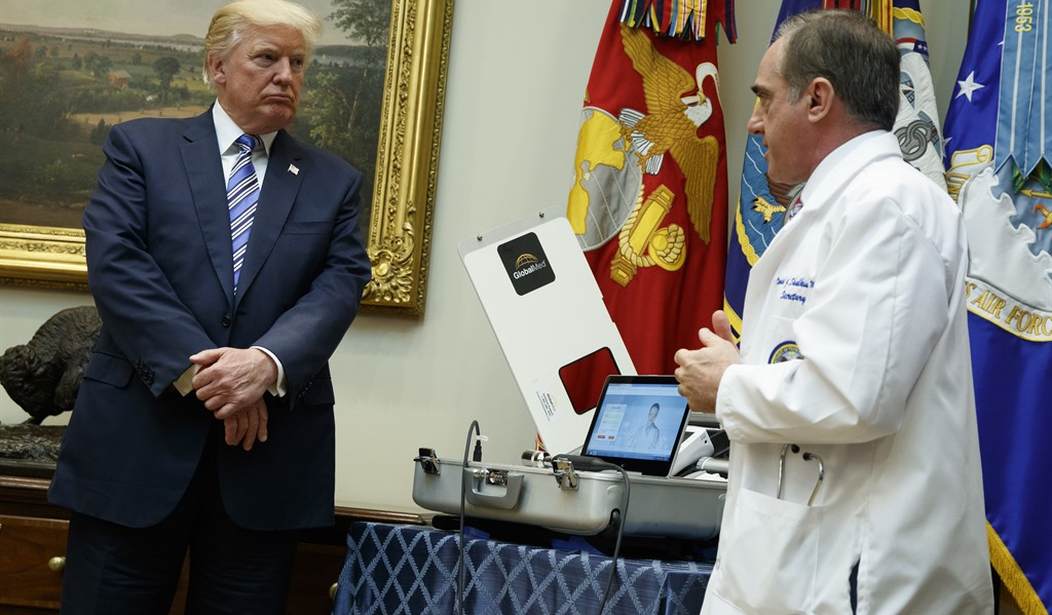Dr. Jonathan Baugh, an emergency medicine physician who works out of Utah, knows firsthand what a major role telemedicine can play during this coronavirus outbreak. He's the Chief Medical Officer and Co-Founder of Remote Health Solutions, a full service telemedicine provider, and he routinely conducts virtual exams with patients.
The classic telemedicine meeting, he explained, is a FaceTime video conference call. They have the capability to locate a patient with a device that has associated peripherals and includes items such as thermometers and scales. Remote Health Solutions works with providers or primary care physicians to get those tablets into the hands of the patient. The patient uses the tablet to check their vital signs daily, and those results are then forwarded to a "cloud" and give doctors like Baugh the ability to identify changes in trends. Increases in blood pressure, overnight weight gain, etc.
There are a few obvious symptoms that physicians like Dr. Baugh are on high alert for during the COVID-19 outbreak. The big three, most know by now, are cough, fever, and shortness of breath. In some cases, a patient may experience body aches and nausea. But, as the doctor explained, identifying the symptoms alone aren't enough. They also need to look at the individual's medical history.
Of course, there are cases where Dr. Baugh has had to tell his patient to stop talking to him online and go to their local hospital.
"We are seeing patients where that is exactly the story," he explained to Townhall. "They tell the right story, we recommend them to go and get that definitive exam and swab so we can start the isolation. If they're mild or low risk then we can quarantine or isolate in place and continue to monitor them there. If vital signs change, then we can instruct them to see the ER."
Recommended
Those with mild symptoms are instructed to monitor their vital signs twice a day. For severe symptom patients, they are instructed to monitor every six-hour vital sign monitoring and twice a day telemedicine exams "to stay ahead of the curve."
Adam Hardage, CEO of Remote Health Solutions, put an exclamation point on the need for telehealth at this critical moment.
"There's no more important discipline to stop the spread besides telehealth," he said. "Period full stop. You need diagnostic telehealth. You've got to start with containment. You have to remotely diagnose the problem."
I asked both Hardage and Dr. Baugh to rate the White House coronavirus task force's efforts thus far, and how it's impacted their own work.
Dr. Baugh said that "they're steering the ship in the right direction," but he had some concerns about President Trump's optimistic timeline. Trump recently said he'd like to see the country reopen by Easter.
"One thing I worry about, is we're starting to hear the desire to lift the ban," Dr. Baugh said. "I do worry we haven't given it enough time. Because while New York, Washington and California may hit that peak before Easter, the majority of the country may not. We will still be climbing by Easter."
As for Hardage, he wants to see the money and resources get funneled out of Washington sooner rather than later, especially so they can start to address unsettling equipment shortages. He told me of one hospital where nurses are having to write their names down on their N95 masks and reuse them the next day. They are only supposed to be for one-time use.
"I'm a huge fan of the president of the United States and a big supporter," Hardage noted. "I think they're doing a wonderful job and working as diligently as they can. But what they've got to do is cut the contracting officers loose on this thing so they can get corporate America involved."
Hardage said he's "tearing his hair out" waiting for the government to act.

























Join the conversation as a VIP Member